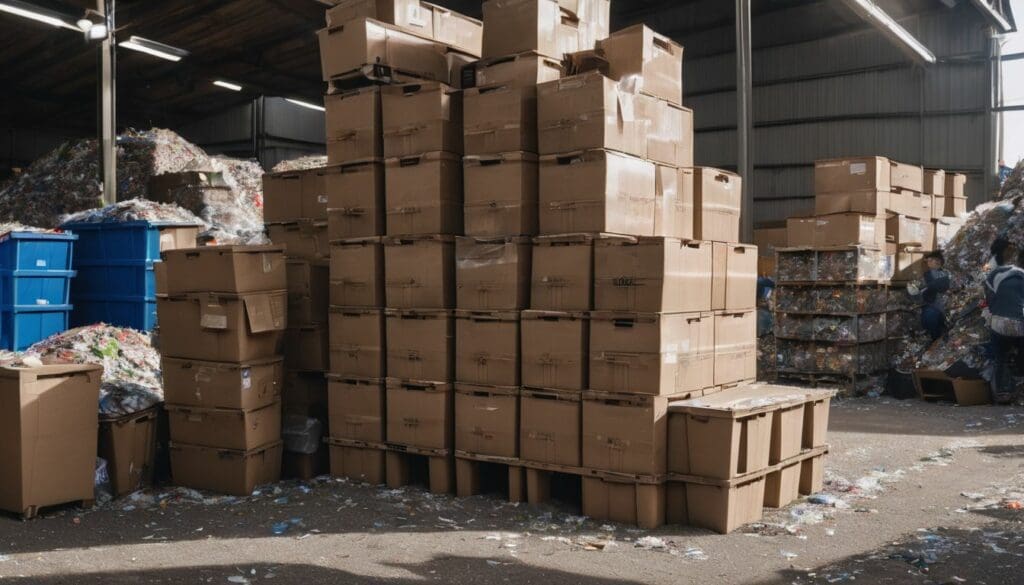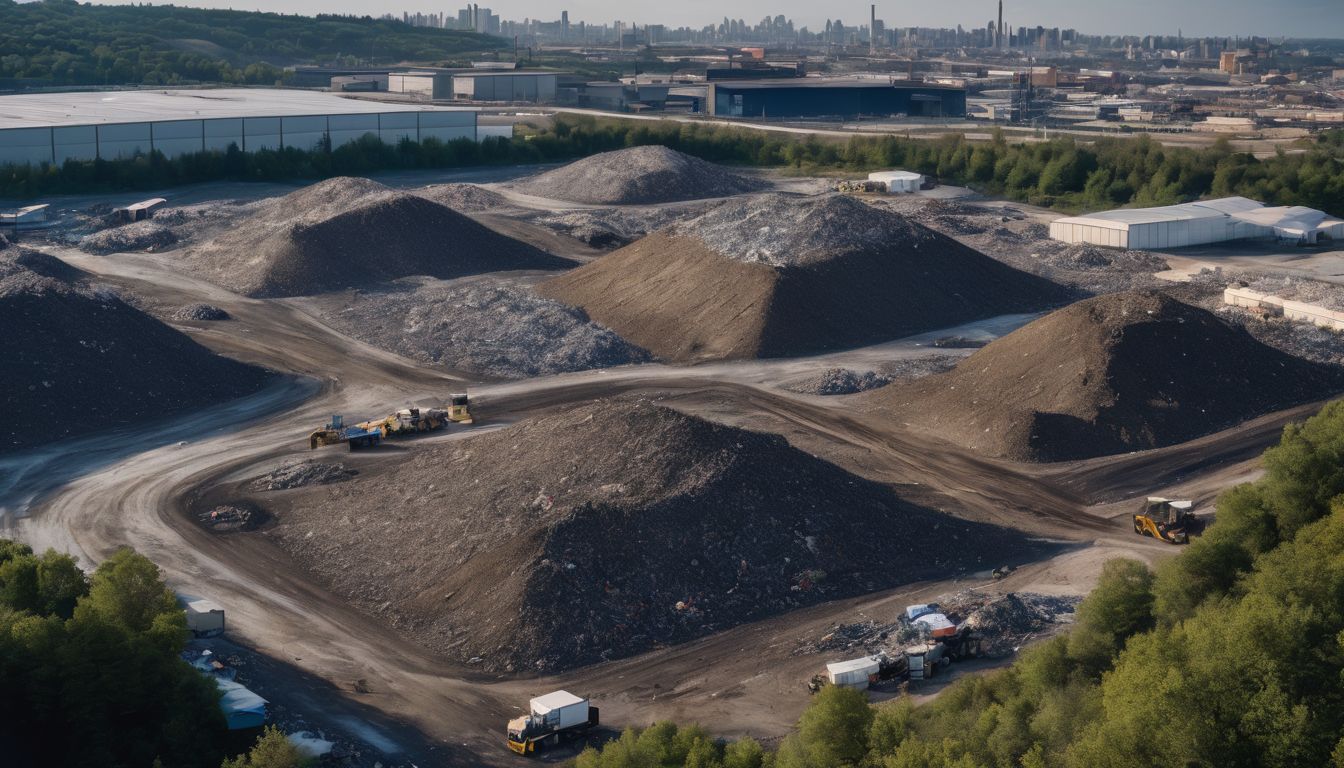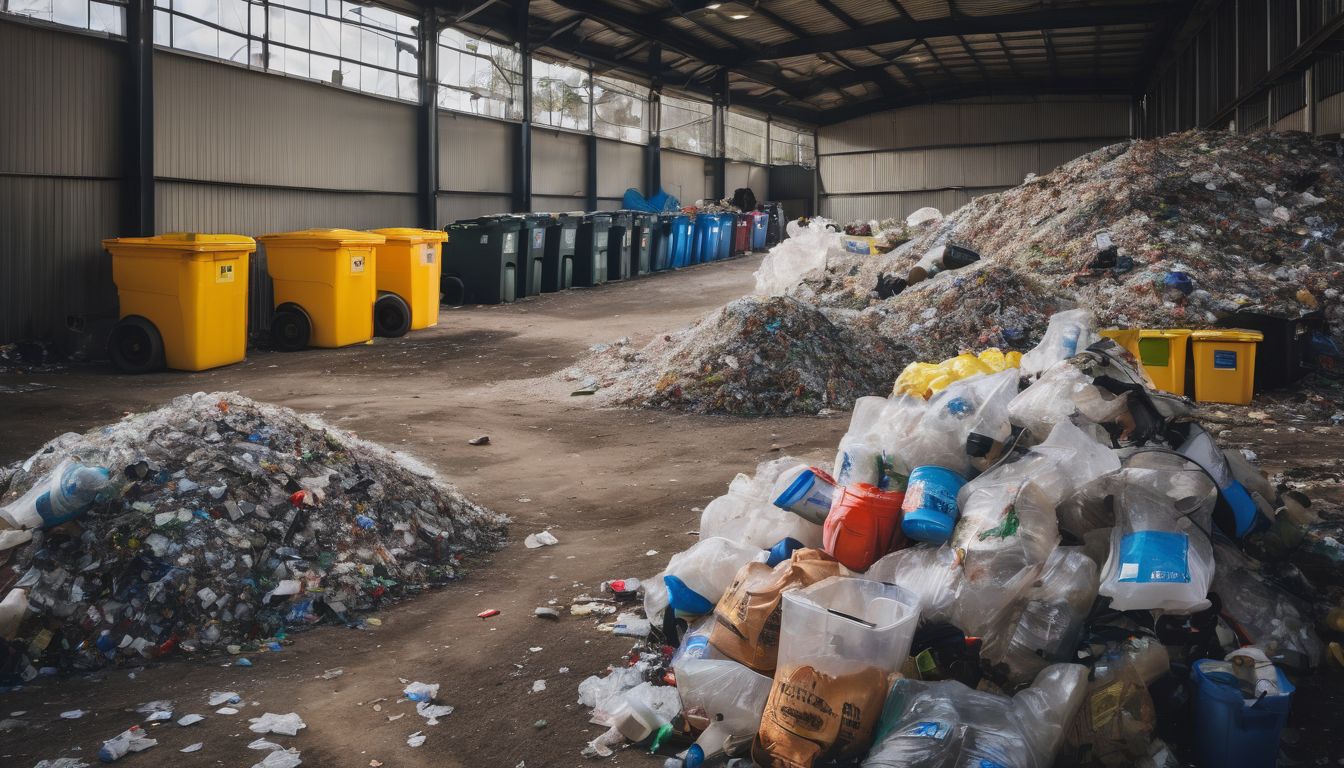Are you puzzled by the rules of recycling in the UK? Each year, Britons recycle millions of tonnes, making it a key part of our battle against waste. Our guide will navigate you through the maze of laws and regulations, ensuring that your efforts count.
Keep reading – it’s easier than you think!
Key Takeaways
- The EU Waste Framework Directive requires the UK to follow strict recycling laws, with a focus on reducing waste and promoting a circular economy, where resources are used for as long as possible.
- UK businesses must manage their waste responsibly by complying with environmental legislation and implementing effective recycling practices to help conserve natural resources.
- Households in the UK are set specific recycling targets to encourage the separation of materials like paper, plastic, and glass to reduce landfill use and carbon footprint.
- Composting organic waste at home is encouraged under UK laws as it decreases landfill content, while various incentives exist for those adhering to sustainable waste management practices.
- Meeting recycling targets significantly aids environmental protection by lowering greenhouse gas emissions and conserving energy through reduced raw material extraction.
UK Recycling Laws
The UK has stringent recycling laws in place, including the EU Waste Framework Directive, government policies, and targets for business and household recycling. It is important to understand these laws to ensure compliance with waste management legislation.
EU Waste Framework Directive
EU Waste Framework Directive sets the stage for waste management across member states, including the UK. It establishes a legal structure that dictates how to handle waste in an environmentally responsible manner.
This directive aims to protect the environment and human health by emphasising recycling and resource recovery. It encourages a shift towards a circular economy, where the value of products, materials and resources is maintained for as long as possible.
UK laws must align with this directive’s requirements, which means setting ambitious recycling targets and defining what counts as recyclable material or waste. Waste producers have clear responsibilities under these rules to prevent, reuse or recycle waste before considering disposal options like landfill or incineration.
The directive also promotes sustainable practices such as composting, giving life to organic waste instead of it contributing to pollution.
Government policies
Government policies play a crucial role in shaping the framework for recycling in the UK. These policies set out specific targets and regulations to ensure that businesses and households adhere to environmentally responsible practices.
By implementing statutory instruments and waste management laws, the government aims to promote environmental sustainability while holding waste producers accountable for their recycling responsibilities.
Additionally, EU recycling targets for the UK further influence government policies, driving efforts to increase recycling rates and reduce overall waste generation. As such, understanding these policies is essential for individuals committed to supporting conservation efforts and promoting a greener environment through effective waste management initiatives.
Business responsibilities
Businesses play a crucial role in the UK’s recycling efforts. They are responsible for managing and reducing their waste, ensuring compliance with environmental legislation and waste regulations.
This includes separating recyclable materials, adhering to recycling targets, and implementing effective waste management practices. By fulfilling these responsibilities, businesses contribute to the overall goal of sustainable waste reduction and environmental protection.
In addition to legal compliance, businesses can also take proactive steps by implementing green initiatives such as composting organic waste and reusing materials within their operations.
Household recycling targets
Household recycling targets aim to reduce the amount of waste sent to landfills and increase the percentage of recyclable materials. These targets encourage households to separate their waste into categories such as paper, plastic, and glass for collection.
By meeting these targets, individuals contribute towards a more sustainable environment by reducing their carbon footprint and conserving natural resources. Meeting household recycling targets is vital in supporting the UK’s overall waste management goals and ensuring a cleaner, greener future for generations to come.
Legislation
EU regulations and new waste laws in the UK provide the legal framework for recycling and waste management, ensuring that businesses and households adhere to specific targets and responsibilities.
Learn more about these important legal aspects of recycling by reading the full blog.
EU regulations
The EU regulations play a crucial role in shaping the UK’s recycling laws. These regulations set the framework for waste management and recycling targets, which guide the government policies and business responsibilities.
The new waste regulations introduced by the EU have brought about significant changes in how waste is managed and recycled in the UK, with a focus on increasing recycling rates and reducing environmental impact.
Moreover, EU regulations also emphasise composting and reusing waste as incentives for achieving recycling targets. As part of these efforts, household recycling targets have been established to encourage individuals to contribute towards sustainable waste management practices.
New waste regulations
New waste regulations in the UK aim to improve recycling rates and reduce environmental impact. These regulations set stricter guidelines for waste management, including increased recycling targets for households and businesses.
The new rules also emphasise proper disposal of electronic waste and measures to minimise food waste. Additionally, they require businesses to take greater responsibility for their own packaging waste by ensuring it is reused or recycled.
To support these regulations, the government has introduced financial incentives for companies that use environmentally friendly materials and processes. Furthermore, there are penalties for non-compliance with the new regulations, which are intended to encourage proactive adherence to sustainable waste management practices.
Incentives for Recycling
From composting and reusing waste to meeting recycling targets, the UK provides various incentives to encourage responsible waste management. Discover how these initiatives benefit both the environment and society.
Read more about the legal aspects of recycling in the UK to learn how you can contribute to a sustainable future.
Composting and reusing waste
- Utilise a compost bin or heap for organic waste such as fruit and vegetable peelings, coffee grounds, and eggshells.
- Consider using a wormery to compost kitchen scraps and produce nutrient-rich fertiliser for plants.
- Repurpose glass jars, plastic containers, and cardboard packaging for storage or crafts.
- Donate unwanted clothing, furniture, and household items to charity shops or community organisations.
Recycling targets
Household recycling targets set by the UK government aim to reduce waste and promote sustainability. Meeting these targets is crucial for achieving a more environmentally friendly society.
Businesses and individuals play a significant role in reaching these goals by separating recyclable materials from general waste. The UK’s efforts to increase recycling rates are essential in reducing the environmental impact of waste while conserving valuable resources.
Focusing on meeting these targets will lead to a cleaner, greener future for the United Kingdom.
Businesses and households alike must work together to achieve the set recycling targets, contributing towards a healthier environment through reduced landfill waste and increased reuse of valuable resources.
Criticisms
Many critics argue that the complexity of recycling legislation and multiple containers for different types of waste make it difficult for households to effectively participate in recycling efforts.
To learn more about these criticisms and the legal aspects of recycling in the UK, read on.
Complexity of legislation
Navigating the legal landscape of recycling in the UK can be challenging due to the intricate web of legislation and regulations. Understanding the European Union waste regulations, new UK waste regulations, and household waste legislation requires careful attention to detail.
The multiple containers and fortnightly collections add another layer of complexity for businesses and households striving to meet recycling targets. Compliance with these laws demands a thorough understanding of recycling policies to ensure that environmental regulations are met effectively.
Multiple containers
Households in the UK often use multiple containers for recycling, separating paper, plastic, glass, and metal to comply with waste management laws. People must ensure that each type of waste goes into the correct container to meet recycling targets and reduce environmental impact.
The process aims to make it easier for recycling facilities to process materials efficiently.
The collection of recyclables through multiple containers helps decrease contamination and increases the value of recycled materials. It also encourages individuals to be more mindful of their daily waste production and fosters a culture of sustainability within communities.
Fortnightly collections
Households in the UK must adhere to fortnightly collections for recycling and waste, as per current legislation. These regular pickups encourage consistent waste management practices, supporting national recycling targets and reducing environmental impact.
By separating recyclables from general waste every two weeks, individuals play a vital role in preserving natural resources and minimising landfill contributions.
Furthermore, such routines promote mindful consumption and responsible disposal habits among residents. The frequency of collections aims to enhance public awareness about the significance of sustainable waste management in safeguarding the environment.
Conclusion
Adhering to recycling laws in the UK is crucial for protecting the environment and achieving sustainability. The potential impact of effective waste management on future generations cannot be overstated.
The importance of adhering to recycling laws
Adhering to recycling laws is crucial for protecting the environment and conserving natural resources. By following these regulations, waste producers contribute to reducing pollution and landfill usage.
Compliance with recycling laws also supports the achievement of national recycling targets, promoting a sustainable future for our communities and ecosystems.
Ensuring that everyone adheres to recycling laws will significantly reduce the environmental impact of waste and promote a healthier planet for future generations. Moving on from the legal aspects of UK recycling, let’s delve into understanding household responsibilities in waste management.
Potential impact on the environment.
Recycling in the UK has a significant potential impact on the environment. By adhering to recycling laws and targets, waste producers can reduce the amount of waste sent to landfills, leading to decreased pollution and conservation of natural resources.
Recycling also helps in lowering greenhouse gas emissions, promoting cleaner air and water for communities across the United Kingdom.
Moreover, meeting recycling targets contributes to a more sustainable future by conserving energy and reducing the need for raw material extraction. It also aids in preserving wildlife habitats and mitigating environmental degradation caused by resource exploitation.
FAQs
1. What are the main waste management laws in the UK?
The main UK waste management laws include rules that focus on reducing household waste and meeting recycling targets to keep our environment clean.
2. Who has responsibilities for recycling under UK law?
In the United Kingdom, both businesses and individuals have responsibilities as waste producers to follow legal guidelines for proper recycling practices.
3. Are there specific recycling targets that the UK is aiming to achieve?
Yes, there are specific recycling targets set by UK policy makers which aim to increase the amount of materials recycled and reduce waste across the nation.
4. How does the government monitor if we’re doing enough recycling?
The government uses statistics and reports on how much we recycle in order to check if we meet required standards according to UK household legislation and policies.





